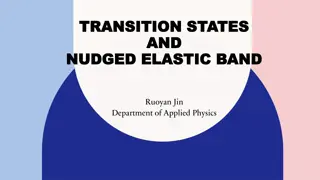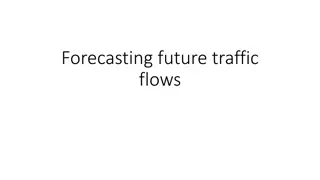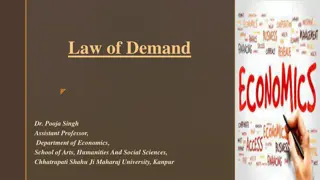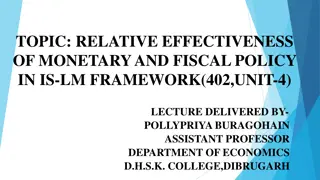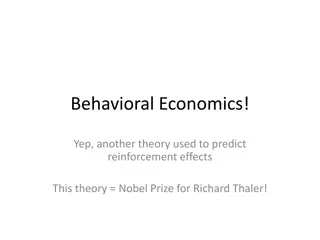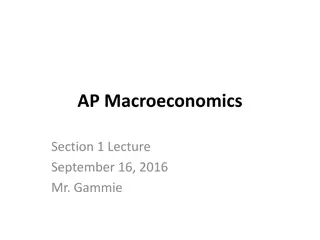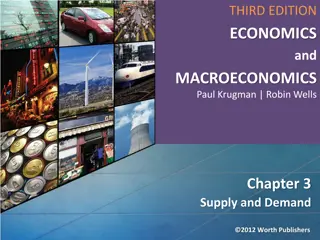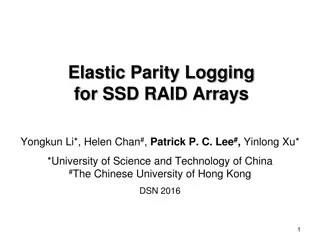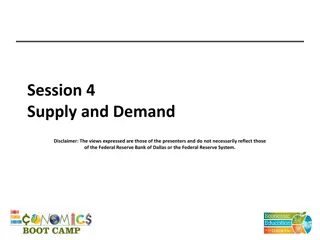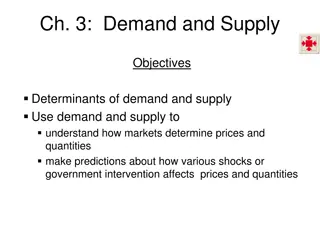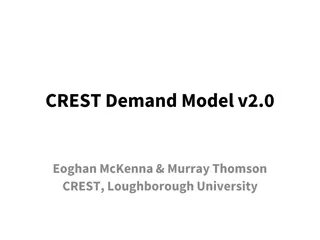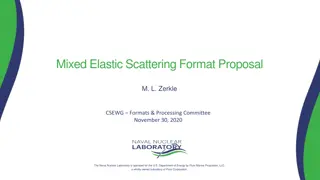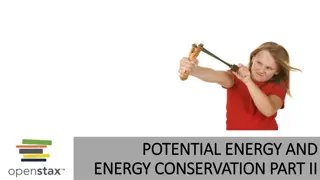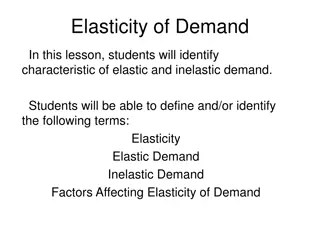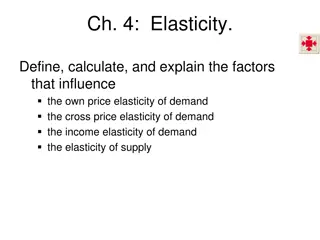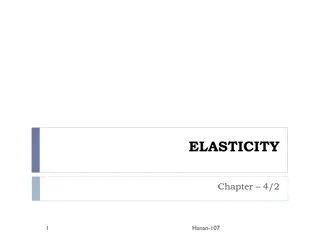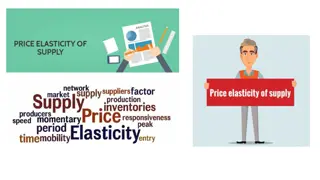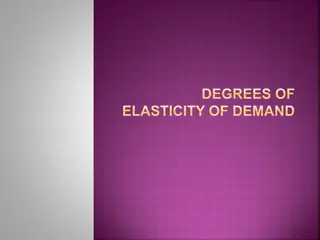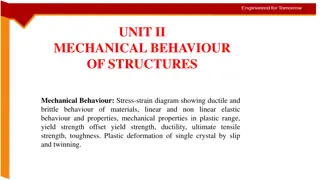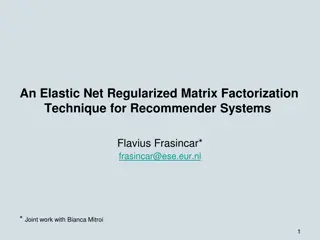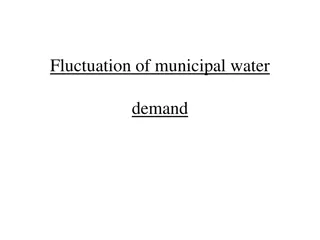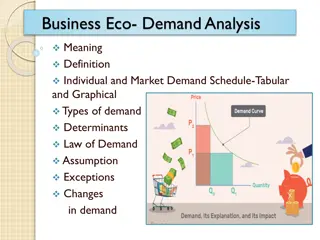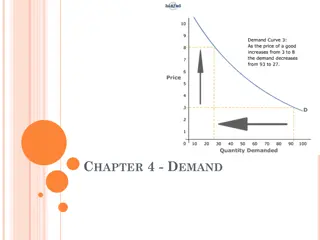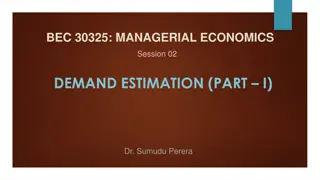Demand Estimation and Demand Forecasting
Demand estimation and forecasting are crucial processes for businesses to predict future demand for their products or services. Demand estimation involves analyzing the impact of various variables on demand levels and pricing strategies, while demand forecasting helps in planning production, new pro
0 views • 7 slides
INVENTORY MANAGEMENT.
Managing inventory under ISO 15189 guidelines involves Quantity, Quality, and Process management. Key aspects include demand forecasting, inventory movement control, consumption planning, and ensuring fitness for purpose. Quantity management aims to balance demand and supply, manage supply economics
5 views • 13 slides
Understanding Amazon EC2: Elastic Compute Cloud Fundamentals
Amazon Elastic Compute Cloud (EC2) is a web service provided by Amazon Web Services (AWS) that offers resizable compute capacity in the cloud. EC2 allows users to rent virtual servers known as instances to run applications. Key features include various instance types, Amazon Machine Images (AMIs), s
11 views • 5 slides
Understanding Transition States and Nudged Elastic Band in Applied Physics
Description of transition states, potential energy surfaces, saddle points, minimum energy paths, and the Nudged Elastic Band method in the context of applied physics. The content explains key concepts such as transition states along reaction coordinates, the significance of potential energy surface
0 views • 9 slides
Principles of Traffic Demand Analysis and Highway Demand Forecasting
Understanding traffic flows is crucial in designing highways and managing traffic effectively. Traffic demand analysis involves forecasting future traffic volumes, modeling demand, and determining the necessary infrastructure improvements. This analysis helps in estimating axle loadings, pavement th
0 views • 36 slides
Understanding Demand in Economics: Chapter 4 Overview
Demand in economics is dictated by the law of demand, where lower prices lead to increased purchases and vice versa. This chapter delves into the factors influencing demand, such as substitution effects, income effects, demand schedules, and market demand. Learn how shifts in the demand curve impact
0 views • 26 slides
Understanding the Law of Demand in Economics
The Law of Demand, explained by Dr. Pooja Singh, Assistant Professor at Chhatrapati Shahu Ji Maharaj University, Kanpur, outlines the inverse relationship between the price of a commodity and the quantity demanded. This fundamental economic principle states that as the price of a product decreases,
0 views • 9 slides
Understanding Monetary Policy Effectiveness in the IS-LM Framework
The relative effectiveness of monetary policy in influencing investment, employment, output, and income depends on the shape of the LM curve and the IS curve. A steeper LM curve signifies higher effectiveness as it indicates less interest elastic demand for money, resulting in significant changes in
0 views • 24 slides
Understanding Behavioral Economics and Its Application
Behavioral Economics is a theory that predicts reinforcement effects, winning Richard Thaler a Nobel Prize. It applies economic principles to behavior, with premises on experimental characteristics, elastic demand of reinforcers, and choice behavior complexity. Terms like demand, commodity, price, a
2 views • 39 slides
Insights on Price Elasticity of Demand and Consumer Behavior
Understanding the concept of price elasticity of demand, this content explores how changes in price affect consumers' buying behavior. It covers the Veblen effect, Giffen goods, Marshall's example on staple foods, and the responsiveness of demand to price fluctuations. The content also explains elas
5 views • 31 slides
The Hidden Benefit of Cool Roofs in Reducing Peak Energy Demand
Commercial building owners can reduce peak energy demand by installing cool roofs, leading to lower electricity costs and environmental benefits. Peak energy demand can strain the power grid, require additional capacity, and result in higher electricity rates. By understanding base use and peak dema
0 views • 31 slides
Understanding Demand in Macroeconomics: Key Concepts and Laws
Exploring the fundamental concepts of demand in AP Macroeconomics, including quantity demanded, demand schedules, the law of demand, and key terms. Practice questions help reinforce learning by testing knowledge on factors affecting demand for various goods. Through visual aids and explanations, rea
0 views • 17 slides
Understanding Supply and Demand in a Competitive Market
This content delves into the concept of supply and demand in a competitive market as described by the renowned economists Paul Krugman and Robin Wells. It covers the basics of a competitive market, the dynamics of supply and demand curves, movements along curves, market equilibrium, and how prices a
0 views • 42 slides
Elastic Parity Logging for SSD RAID Arrays
SSDs are widely used for their performance and efficiency, but face challenges like flash errors and poor random write performance. The paper introduces EPLog, a new RAID design for SSD arrays, enhancing reliability, endurance, and performance through elastic parity logging. The solution redirects w
0 views • 23 slides
Understanding Supply and Demand in Economics
Exploring the interaction of supply, demand, and price in economics through topics such as market dynamics, characteristics of competitive markets, the law of demand, determinants of demand, and shifting demand. Gain insights into how changes in price and various factors affect supply and demand equ
0 views • 24 slides
Understanding Supply and Demand in Economics
Supply and demand play a crucial role in determining trade in economics. Buyers purchase goods and services, while sellers earn money from selling. The equilibrium price is determined by the willingness of buyers and sellers to trade. Demand encompasses the desire, willingness, and ability to buy a
0 views • 20 slides
Understanding Demand and Supply in Market Economics
Explore the fundamentals of demand and supply in market economics, analyzing how prices and quantities are determined. Learn about the factors influencing demand and supply, and how various external factors impact market dynamics. Discover the principles behind the law of demand, demand curves, shif
0 views • 20 slides
Understanding the Law of Demand in Economics
The Law of Demand explains the inverse relationship between the price of a product and the quantity demanded. As the price increases, demand decreases, and vice versa. Factors affecting demand include the price of substitute and complementary goods, consumer income, preferences, and time. The Demand
0 views • 17 slides
CREST Demand Model v2.0 Eoghan McKenna & Murray Thomson
The CREST Demand Model v2.0, developed by Eoghan McKenna & Murray Thomson at Loughborough University, is a comprehensive simulation tool that analyzes the energy demand of dwellings. It considers factors such as solar thermal collectors, climate data, irradiance, electrical demand, temperature, gas
0 views • 4 slides
Mixed Elastic Scattering Format Proposal
This proposal focuses on introducing a Mixed Elastic Scattering format to address the need for a more rigorous treatment of thermal elastic scattering effects in selected nuclides. The format extension, compatible with ENDF-6, supports advanced moderator development without impacting existing TSL ev
0 views • 6 slides
Understanding Elastic Pendulum: Observing Changes in Spring Forces
In this activity, students analyze variations in the periodicity of the elastic force of a spring acting as a pendulum. The objective is to estimate approximate values for pendulum and elastic oscillation periods and establish a relation between them. The theory explains the behavior of oscillatory
0 views • 21 slides
Understanding Elastic Potential Energy and Energy Conservation Principles
Elastic potential energy is stored in elastic bodies like springs and is vital in understanding energy conservation principles. This energy can be calculated using the work done by an ideal spring on a block. By applying elastic potential energy concepts, one can analyze scenarios where a spring sys
0 views • 9 slides
Understanding Elasticity of Demand and Factors Affecting It
Identify the characteristics of elastic and inelastic demand, define terms like Elasticity, Elastic Demand, and Inelastic Demand. Explore why we still buy gas despite rising prices, the concept of elastic and inelastic demand using examples like pants and apple juice. Learn about factors influencing
0 views • 16 slides
Understanding Price Elasticity of Demand in Economics
Price elasticity of demand is a crucial concept in economics that measures how much the quantity demanded of a good changes in response to a change in its price. Factors influencing own-price elasticity, cross-price elasticity, income elasticity, and supply elasticity are explained and illustrated u
0 views • 19 slides
Understanding Price Elasticity of Demand in Economics
Price elasticity of demand is a crucial concept in economics, as it measures the responsiveness of quantity demanded to price changes. A higher elasticity value indicates a more significant impact of price changes on demand. The concept helps businesses understand how changes in pricing affect their
0 views • 8 slides
Investigation of Spin Observables in Elastic pp and p(bar)p Scattering at SPASCHARM Program
Measurements of spin observables in elastic pp and p(bar)p scattering at 16 GeV will be conducted at the SPASCHARM program using a unique setup with polarized proton and antiproton beams. The experiment aims to extend the energy range for spin studies and compare elastic scattering in pp and p(bar)p
0 views • 24 slides
Understanding Elasticity in Economics
Elasticity in economics refers to the responsiveness of demand to price changes. A more elastic curve results in larger quantity changes for small price changes, while a less elastic curve requires larger price changes to affect quantity consumed. The elasticity of demand can be measured by calculat
0 views • 13 slides
Understanding Price Elasticity of Supply in Economics
Price elasticity of supply measures how much the quantity supplied responds to changes in price. It can be inelastic (quantity supplied responds slightly), elastic (quantity supplied responds substantially), or unit-elastic (price elasticity of supply equals 1). Various determinants like the passage
0 views • 16 slides
Understanding Degrees of Elasticity of Demand
Elasticity of demand refers to the responsiveness of quantity demanded to changes in price. Perfectly elastic demand occurs when there is an infinite demand at a particular price and demand becomes zero with a slight rise in price. Conversely, perfectly inelastic demand occurs when there is no chang
0 views • 11 slides
Mechanical Behavior of Structures: Stress-Strain Diagrams and Elastic Properties
Understanding the mechanical behavior of structures involves analyzing stress-strain diagrams, distinguishing between ductile and brittle materials, exploring linear and non-linear elastic properties, studying plastic deformation, yield strength, ultimate tensile strength, and toughness. Elastic beh
0 views • 32 slides
Understanding Supply and Demand in Competitive Markets
Supply and Demand are crucial forces in market economies that determine prices and quantities of goods. This content explores the concept of competitive markets, the relationship between demand and price, and the impact of related goods on demand. It delves into market dynamics through examples such
0 views • 50 slides
Elastic Security Virtualization with vNIDS
Explore the concept of Elastic Security through Safe and Efficient Virtualization of Network Intrusion Detection Systems using vNIDS. This study delves into the challenges of traditional NIDSes, the requirements for virtualized environments, traffic volume variations, new trends in network function
0 views • 36 slides
Seasonal Variations in Demand Forecasting Using Multiplicative Seasonal Model
Understanding and utilizing the multiplicative seasonal model for demand forecasting involves computing average historical demand for each season, determining the average demand across all seasons, calculating seasonal indices, and estimating total demand for the upcoming year based on these factors
0 views • 25 slides
Elastic Net Regularized Matrix Factorization for Recommender Systems
This research paper presents an elastic net regularized matrix factorization technique for recommender systems, focusing on reducing the dimensionality of the problem and utilizing features to describe item characteristics and user preferences. The approach combines existing algorithms and applies e
0 views • 27 slides
Understanding Demand and Consumer Behavior in Economics
Demand in economics refers to the quantity of a commodity consumers are willing to buy at a given price within a specific time period. Various factors influence demand, such as price, consumer income, related goods prices, consumer preferences, advertising, and population size. Types of demand inclu
0 views • 20 slides
Understanding the Market Force of Demand
Demand is essential in economics, representing the quantity buyers are willing to purchase at different prices. The Law of Demand asserts that as prices rise, demand falls. Through demand schedules and curves, we analyze how factors like price, number of buyers, income, and related goods influence d
2 views • 13 slides
Understanding Municipal Water Demand Fluctuations
There is a wide variation in seasonal, daily, and hourly water demands for municipal water supply. Factors like working days, weather conditions, and time of day influence the demand patterns. Analysis of average demand, maximum day demand, and peak hourly demand is crucial for capacity planning of
0 views • 6 slides
Understanding Demand Analysis in Economics
Demand analysis in economics involves studying individual and market demand, demand schedules, determinants, the law of demand, exceptions, and factors influencing changes in demand. Dr. Sachin M. Prayag explains the concept of demand, including desire, willingness to pay, and ability to pay, with g
0 views • 15 slides
Understanding Demand in Chapter 4
In Chapter 4, the concept of demand is explored, encompassing the desire, ability, and willingness to purchase a product. It delves into the demand schedule, demand curve, law of demand, and factors influencing demand such as consumer income. The chapter also covers marginal utility and the diminish
0 views • 18 slides
Managerial Economics - Understanding Demand Estimation Fundamentals
Delve into the world of managerial economics with a focus on demand estimation. Explore concepts such as the law of demand, price elasticity, market demand vs. individual demand, and the demand curve. Learn how to analyze consumer behavior and predict market trends through quantitative analysis tech
0 views • 20 slides



